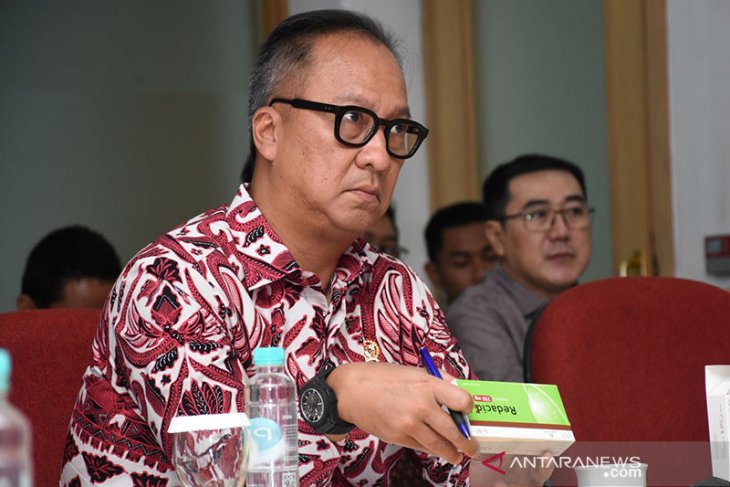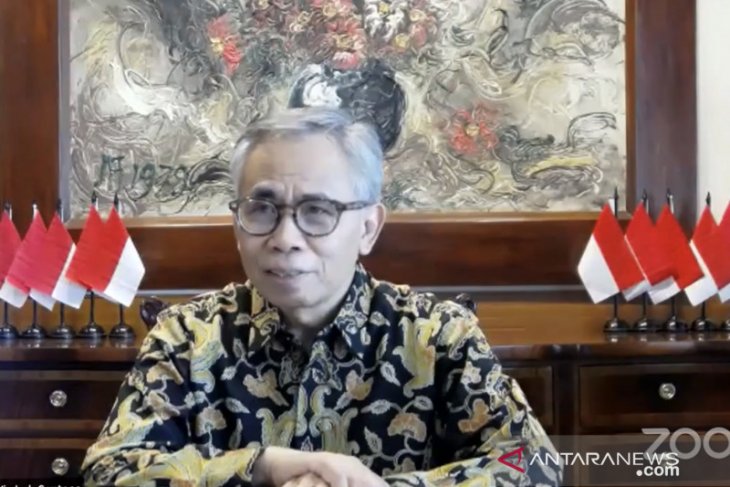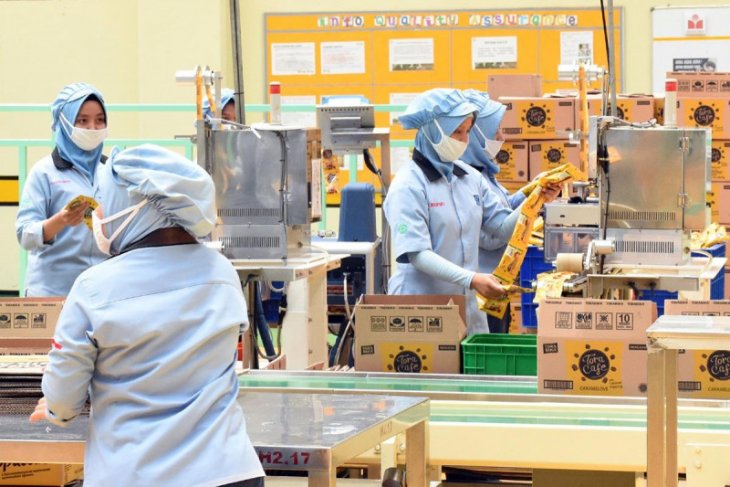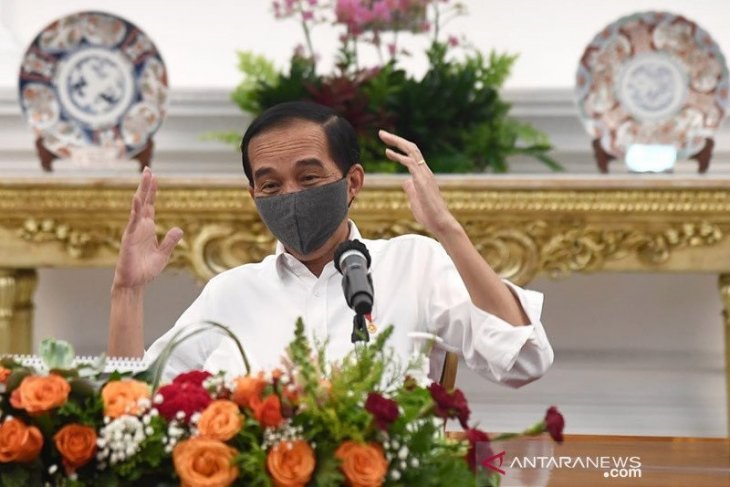Live Streaming
Program Highlight
Company Profile

Ani Hasanah
July
 Industry Minister Agus Gumiwang Kartasasmita. ANTARA/HO-Industry Ministry/pri./sh
Industry Minister Agus Gumiwang Kartasasmita. ANTARA/HO-Industry Ministry/pri./sh
Industry Minister Agus Gumiwang Kartasasmita shed light on five movements for bringing about industrial transformation to address the evolving order in all sectors, including the manufacturing industry, owing to the COVID-19 pandemic.
The five movements, also termed the 5R movements, are aimed at tackling the pandemic within the company's environment by involving employees to apply health protocols.
"Second, resilience or moves to support the company to survive. Third, return to normal activity by considering key aspects for each company," Kartasasmita noted in a statement in Jakarta on Friday.
The three movements should be supported by two other movements: re-imagination and reform.
Kartasasmita highlighted the need for companies to re-map their businesses by taking into account the current new scenario and reform their business models to seize the opportunity.
"Thus, we are optimistic of a transformation in the industry sector toward the era of Industry 4.0 or swiftly adapt to the new normal scenario amid the impact of the pandemic," he noted.
Kartasasmita remarked that the manufacturing industry was projected to help drive the country's economic transformation to recover from the pandemic.
"Some strategic moves have been readied to enhance productivity and competitiveness in the processing sector, among others, by optimizing the potential of Industry 4.0 to adapt to the new situation," he added.
The manufacturing industry should be able to transform and adapt to the changing economic conditions, the minister remarked. (ANTARA)
July
 Chairman of the Board of Commissioners of the Financial Services Authority (OJK) Wimboh Santoso in an online discussion, Jakarta, Thursday (July 23, 2020). ANTARA/AstridFaidlatulH.
Chairman of the Board of Commissioners of the Financial Services Authority (OJK) Wimboh Santoso in an online discussion, Jakarta, Thursday (July 23, 2020). ANTARA/AstridFaidlatulH.
Chairman of the Financial Services Authority's (OJK's) Board of Commissioners Wimboh Santoso believes the government's strategy for the economy to recover faster from the COVID-19 pandemic would have a major influence in propelling domestic demand.
"We know that the Indonesian economy is supported more by domestic growth. Hence, this strategy to accelerate recovery will have a significant influence in driving domestic demand," Santoso remarked during an online discussion in Jakarta on Thursday.
The chairman of the OJK Board of Commissioners highlighted the need to pursue the step since Indonesia relies exceedingly on domestic consumption, so it is highly dependent on the recovery strategy adopted by the government.
Santoso detailed the ratio of government expenditure to Indonesia's gross domestic product (GDP): consumption expenditure, 32 percent; imports, nine percent; exports, 11 percent; gross fixed capital formation (PMTB), 17 percent; government consumption, three percent; and household consumption, 28 percent.
To this end, Santoso noted that Indonesia was relatively less affected by the global turmoil since 80 percent of the GDP came from domestic factors.
He cited Singapore's recession in the second quarter of 2020 as was indicated by a nearly 41.2-percent contraction since the country was largely reliant on external factors, such as international trade.
"It is no wonder that various countries that are heavily dependent on international trade and services drop big like Singapore. Indonesia is 80-percent driven by the domestic economy," he pointed out.
In the meantime, Santoso has projected the Indonesian economy to decline in the second quarter and start to improve in the third quarter, although not yet significant.
"At the end of the year, we expect to be even more positive than this projection, and in 2021, we will rise faster because on a very low basis," he remarked.
According to Santoso, the figure for economic growth in 2020 is only a transitional period, so it does not become a standard reference since the strategy for recovery is the most crucial.
He also urged the government to continue to offer stimulus through the state budget to drive domestic demand, so that it has a positive impact on the national economy.
"Budget spending for various programs in the state budget until the end of 2020 can be realized because it will provide ammunition strong enough to encourage domestic demand," he expounded. (ANTARA)
July

Activities in the food and beverage industry. ANTARA/HO-Industry Ministry Public Relation/sh
The food and beverage industry continued to make the largest contribution to exports in the manufacturing sector, with US$13.73 billion and $10.87 billion in exports respectively during the first semester of 2020.
"Food and beverage industries registered a high demand during the COVID-19 pandemic. This is since people are looking to consume nutritious food to boost their immunity," Industry Minister Agus Gumiwang Kartasasmita noted in a statement in Jakarta on Thursday.
Kartasasmita pointed out that small- and medium-scale enterprises dominated the country’s food and beverage industry, so it can become a backbone for the country's economy.
"In accordance with the Making Indonesia 4.0 roadmap, we have set a target for Indonesia's food and beverage industry to dominate the Southeast Asian market," Kartasasmita stated.
Some food and beverage products already have a potential market abroad, such as instant noodles in African nations. To this end, the ministry has encouraged market expansion and export-oriented product diversification.
In the basic metal industry, the improved added value of natural resources has augmented foreign exchange revenue from exports. Moreover, this has breathed new life into the industry to absorb workers, he remarked.
With its position as the mother of industries -- as its products have been used as raw materials for other sectors, such as automotive, maritime, and electronics -- the basic metal industry has also served as the backbone for the country's economy.
"We are encouraging the metal industry to enter the Industry 4.0 through the application of digital technology. This is aimed at boosting productivity and quality. Industry 4.0 is not aimed at reducing the workforce but instead to improve the added value of human resources," he expounded.
During the period from January to June 2020, the export value of manufacturing products had touched $60.76 billion, or 79.52 percent of the total exports of $76.41 billion.
"We will continue to maintain the momentum by accelerating the stimulus for the manufacturing sector in the second semester of 2020. This could encourage the export-oriented industry to increase its production capacity," Kartasasmita explained. (ANTARA)
July

President Joko Widodo (Jokowi). ANTARA/Desca Lidya Natalia/am
President Joko Widodo (Jokowi) urged the Revolving Fund Management Institution for Micro, Small, and Medium Enterprises (LPDB-KUMKM) to immediately disburse Rp1 trillion funding under the National Economic Recovery (PEN) program to cooperative units.
"I am glad to hear that the institution has readied Rp1 trillion. This should soon be disbursed to cooperative units, so they can distribute it to members of the cooperative units," Jokowi remarked in Jakarta on Thursday.
The head of state noted that the government had to work quickly to facilitate the recovery of businesses run by cooperative units as well as micro-, small-, and medium-scale enterprises that have become the backbone for most business operators in the country.
"We only have July, August, and September to rebound. If we can succeed in it, Insya Allah (God willing), the economy in the fourth quarter (of 2020) will show signs of improvement, and next year, it will become easier. We have the opportunity in July, August, and September," he elaborated.
Jokowi stressed on the need to increase state budget spending during the three-month period.
"Our opportunity lies here, and with the support of working capital, we can improve the liquidity of cooperative units," he affirmed.
Furthermore, Jokowi highlighted the importance of simplifying the process to disburse the revolving fund.
"I am upbeat that we can make the process fast and simple. We need quick disbursement and simplification of the process," he noted.
"Do not wait any longer. Help them immediately. Use additional working capital to drive the economy, especially in regions," Jokowi added. (ANTARA)

